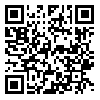Volume 30, Issue 3 (9-2024)
Back to this Issue |
Back to browse issues page
Download citation:
BibTeX | RIS | EndNote | Medlars | ProCite | Reference Manager | RefWorks
Send citation to:



BibTeX | RIS | EndNote | Medlars | ProCite | Reference Manager | RefWorks
Send citation to:
Mohammadi F, Taherkhani S, Zamanian M, Elahy E. The effect of life skills group counseling with a cognitive-behavioral approach on coping strategies among abused women. Journal of Hayat 2024; 30 (3) :307-324
URL: http://hayat.tums.ac.ir/article-1-5352-en.html
URL: http://hayat.tums.ac.ir/article-1-5352-en.html
1- Students Research Committee, Arak University of Medical Sciences, Arak, Iran
2- Dept. of Midwifery, School of Medicine, Arak University of Medical Sciences, Arak, Iran ,sakinehtaherkhani@yahoo.com
3- Dept. of Epidemiology, School of Health, Arak University of Medical Sciences, Arak, Iran
4- Dept. of Psychology, School of Medicine, Arak University of Medical Sciences, Arak, Iran
2- Dept. of Midwifery, School of Medicine, Arak University of Medical Sciences, Arak, Iran ,
3- Dept. of Epidemiology, School of Health, Arak University of Medical Sciences, Arak, Iran
4- Dept. of Psychology, School of Medicine, Arak University of Medical Sciences, Arak, Iran
Abstract: (269 Views)
Background & Aim: The coping strategies employed by women in facing violence can influence the frequency and intensity of violence or related stress. Life skills training may serve as a way for improving these coping strategies. This study aims to determine the effect of life skills group counseling, using a cognitive-behavioral approach, on the coping strategies of abused women.
Methods & Materials: This quasi-experimental study involved 120 abused women who attended health centers affiliated to Arak University of Medical Sciences in 2022. Participants were assigned to an intervention group or a control group (60 people each). The intervention group participated in eight group counseling sessions focused on life skills training through a cognitive-behavioral approach. Data were collected using a demographic questionnaire, the Conflict Tactics Scale, and the Ways of Coping Questionnaire. Coping strategies were assessed at the end of the intervention and again 12 weeks later. Descriptive and inferential statistical analyses were conducted to analyze the data.
Results: The intervention led to a significant increase in mean scores for the subscales “distancing” (P<0.001), “planning” (P<0.001), “seeking social support” (P=0.002), and “problem-solving” (P<0.001) in the intervention group compared to the control group. Conversely, there was a significant reduction in the mean score for the “wishful thinking” subscale (P<0.001). The most substantial effect of the intervention was observed in the “planning” subscale, while the “seeking social support” subscale exhibited the least effect. Specifically, the mean±standard deviation scores for the “planning” subscale in the intervention group were 8.95±3.61 pre-test and 14.82±2.40 post-test. For the “seeking social support” subscale, the scores were 5.28±3.21 pre-test and 7.03±1.77 post-test.
Conclusion: Life skills group counseling, utilizing a cognitive-behavioral approach, significantly increased the adoption of coping strategies, such as distancing, planning, seeking social support, and problem-solving, while reducing reliance on wishful thinking among abused women. Therefore, this method can serve as a means to promote coping strategies for abused women.
Methods & Materials: This quasi-experimental study involved 120 abused women who attended health centers affiliated to Arak University of Medical Sciences in 2022. Participants were assigned to an intervention group or a control group (60 people each). The intervention group participated in eight group counseling sessions focused on life skills training through a cognitive-behavioral approach. Data were collected using a demographic questionnaire, the Conflict Tactics Scale, and the Ways of Coping Questionnaire. Coping strategies were assessed at the end of the intervention and again 12 weeks later. Descriptive and inferential statistical analyses were conducted to analyze the data.
Results: The intervention led to a significant increase in mean scores for the subscales “distancing” (P<0.001), “planning” (P<0.001), “seeking social support” (P=0.002), and “problem-solving” (P<0.001) in the intervention group compared to the control group. Conversely, there was a significant reduction in the mean score for the “wishful thinking” subscale (P<0.001). The most substantial effect of the intervention was observed in the “planning” subscale, while the “seeking social support” subscale exhibited the least effect. Specifically, the mean±standard deviation scores for the “planning” subscale in the intervention group were 8.95±3.61 pre-test and 14.82±2.40 post-test. For the “seeking social support” subscale, the scores were 5.28±3.21 pre-test and 7.03±1.77 post-test.
Conclusion: Life skills group counseling, utilizing a cognitive-behavioral approach, significantly increased the adoption of coping strategies, such as distancing, planning, seeking social support, and problem-solving, while reducing reliance on wishful thinking among abused women. Therefore, this method can serve as a means to promote coping strategies for abused women.
Keywords: spouse abuse, social skills, cognitive behavioral therapy, coping, counseling, abused women
Send email to the article author
| Rights and permissions | |
 |
This work is licensed under a Creative Commons Attribution-NonCommercial 4.0 International License. |






